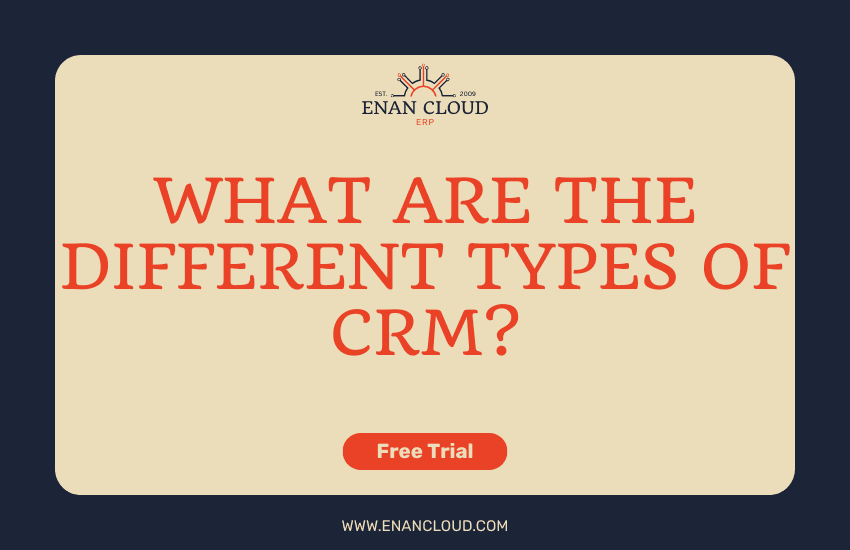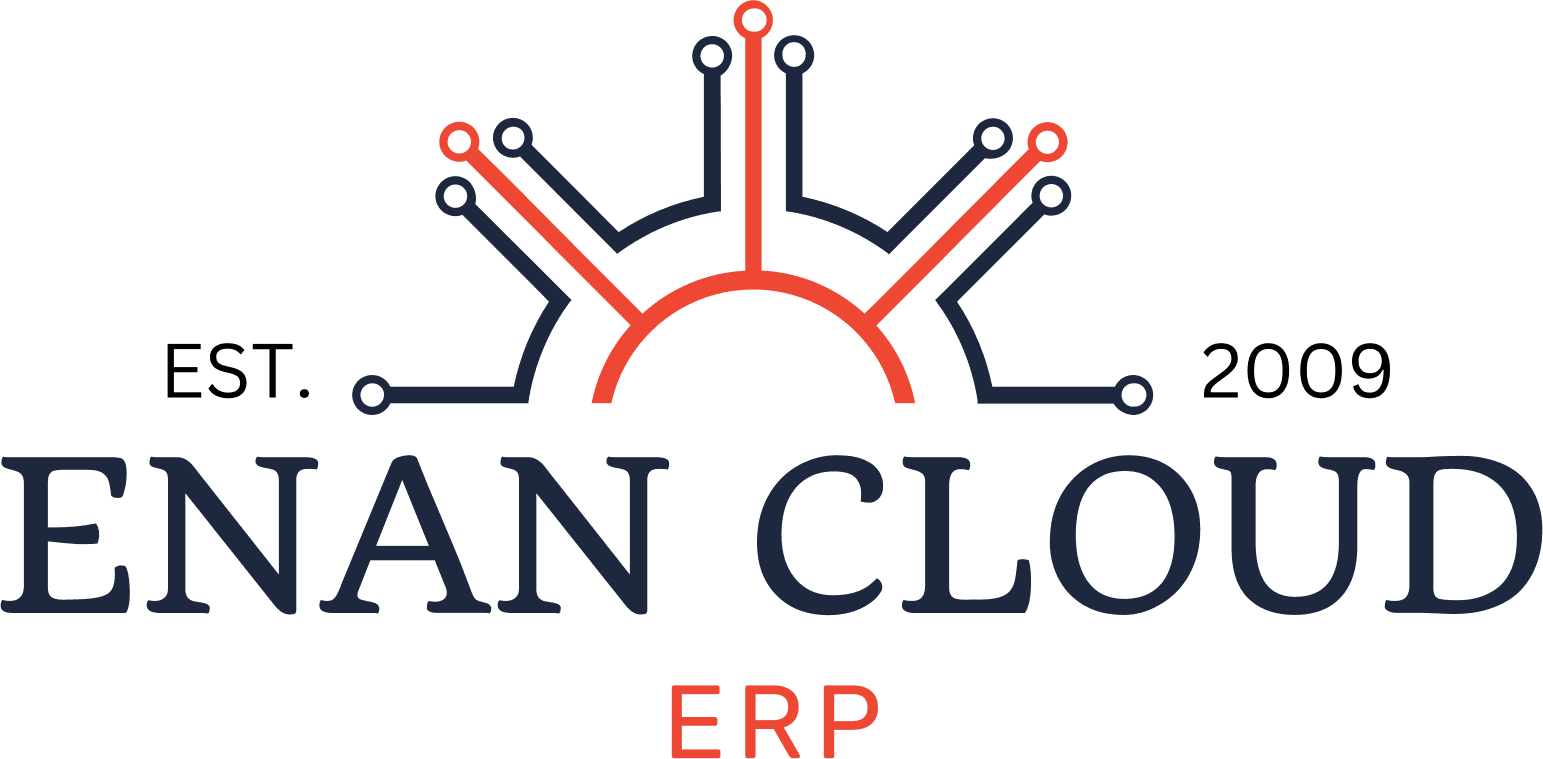Types Of CRM

CRM software is used to manage customer relationships and sales interactions.
A good CRM should encompass marketing, customer support, sales, and sales partner management – really any solution that helps you sell more, improve the customer experience, and boost customer retention and loyalty.
However, CRMs aren’t one-size-fits-all solutions. There are different types of CRMs, each tailored to handle specific business needs.
In this guide, we’ll explore the main types of CRMs, their applications, and how Enan Cloud CRM solutions can help businesses elevate their customer management and boost growth.
Discover the CRM that supports the entire customer journey.
Understanding CRM Systems
Definition of CRM Systems
At its core, a Customer Relationship Management (CRM) system is a tool that allows businesses to manage their interactions with clients and prospects.
A CRM can store contact details, track customer interactions, manage leads, automate sales processes, and even run targeted marketing campaigns.
CRMs provide a unified platform where all team members can access the same customer data, which helps foster consistency across interactions.
Key Features of CRM Platforms
Modern CRM platforms like Enan Cloud offer several essential features:
- Contact and Lead Management: Keep all contact information in one place and manage leads effectively.
- Sales and Marketing Automation: Automate repetitive tasks and campaigns to save time and effort.
- Task and Project Management: Manage tasks, track project progress, and keep clients updated on milestones.
- Analytics and Reporting: Use data insights to optimize sales strategies and improve customer engagement.
- Collaboration Tools: Facilitate communication and data sharing between departments to improve service delivery.
With these features, CRMs allow businesses to streamline customer-facing activities, making it easier to provide top-notch service and nurture long-term relationships.
Operational CRM
Overview of Operational CRM
Operational CRMs focus on automating and streamlining business processes.
This type of CRM supports sales, marketing, and customer service functions by organizing information and automating routine tasks.
It’s especially useful for businesses with frequent customer interactions or companies that want to improve customer-facing processes.
Benefits of Operational CRM
An operational CRM reduces manual work, enhances workflow, and frees up time for team members to focus on other critical tasks.
For instance, instead of manually updating client contact information, a CRM can automatically capture it from online interactions or form submissions.
Enan Cloud ERP’s Operational CRM Features
Enan Cloud offers robust operational CRM features such as:
- Lead Management: Track and manage potential customers effectively.
- One-Click Invoicing and Automated Proposals: Streamline financial interactions with clients.
- Contract Management: Draft, approve, and store contracts securely within the CRM platform.
By simplifying these tasks, Enan Cloud CRM improves team efficiency, enhances customer satisfaction, and enables businesses to operate smoothly.
Analytical CRM
Overview of Analytical CRM
Analytical CRM focuses on data analysis and insights, helping businesses understand customer behaviors, preferences, and trends.
With an analytical CRM, companies can analyze customer data collected from different sources and generate actionable insights to drive better decision-making.
How Analytical CRM Drives Data Insights
Analytical CRMs are valuable for companies looking to predict trends, assess sales performance, and segment customer groups.
By understanding what customers want, companies can tailor their marketing efforts, personalize interactions, and predict future purchasing behaviors.
Enan Cloud Analytical Capabilities
Enan Cloud CRM provides businesses with tools to analyze:
- Sales Data: Assess performance, identify bottlenecks, and forecast trends.
- Customer Segmentation: Group customers based on demographics, purchase history, or preferences.
- Project Insights: Monitor task progress, project milestones, and client satisfaction levels.
This information helps businesses make data-driven decisions that improve customer retention, increase sales, and ultimately drive growth.
Collaborative CRM
What is Collaborative CRM?
Collaborative CRMs are designed to enhance teamwork by facilitating seamless communication and data sharing across different departments.
This CRM type ensures that each team member has access to consistent customer information, allowing them to work together to provide a cohesive and positive customer experience.
Benefits of Collaborative CRM in Customer Service
In a collaborative CRM, customer support, sales, and marketing teams can access customer histories, recent interactions, and other relevant data.
This unified approach allows for personalized support, leading to increased customer satisfaction and loyalty.
Enan Cloud Tools for Seamless Team Collaboration
Enan Cloud CRM system fosters collaboration by providing features like:
- Shared Customer Data: All teams can access consistent and up-to-date customer information.
- Internal Communication Tools: Facilitate discussions and updates between team members.
- Task and Milestone Tracking: Keep all departments informed on project statuses and important deadlines.
Collaborative CRM tools help businesses provide a consistent experience across all touchpoints, ensuring clients feel valued and heard.
Strategic CRM
Overview of Strategic CRM
Strategic CRMs focus on long-term customer engagement by building meaningful relationships.
This type of CRM prioritizes understanding customers’ needs, preferences, and values, allowing businesses to deliver personalized experiences that drive customer loyalty.
How Strategic CRM Enhances Long-term Goals
With a strategic CRM, businesses can anticipate customers’ future needs and proactively engage with them.
This is ideal for companies looking to create lasting customer relationships and reduce churn.
Enan Cloud Strategic CRM Features
Enan Cloud CRM is equipped with strategic tools to support long-term growth, including:
- Client Project Tracking: Clients can track project progress in real time.
- Feedback and Satisfaction Surveys: Capture valuable insights into customer experience and areas for improvement.
- Milestone Notifications: Automatically update clients on completed tasks or upcoming project milestones.
These features make it easy for businesses to stay engaged with customers, fostering relationships that drive repeat business.
Types of CRM Deployment
On-premise CRM
On-premise CRM systems are hosted on a company’s own servers.
While this setup offers greater control and customization, it often requires a significant upfront investment in hardware and IT resources.
On-premise CRMs are typically used by large corporations with in-house IT departments.
Cloud-Based CRM
Cloud-based CRMs are hosted on remote servers and accessed via the internet.
They are often cost-effective and accessible from anywhere, making them a popular choice for small to medium-sized businesses.
Advantages of Cloud Deployment
- Scalability: Businesses can adjust storage and features based on their needs.
- Accessibility: Teams can access CRM data from any device with internet access.
- Cost-Effective: Minimal upfront cost and no need for in-house servers.
Enan Cloud offers a cloud-based CRM solution that provides flexibility and scalability, making it easy for businesses to access powerful CRM tools without heavy investment.
Hybrid CRM
A hybrid CRM combines both cloud-based and on-premise features, allowing companies to balance data control with accessibility.
It is a great option for businesses with diverse needs, as they can choose which components to store on-site and which to host in the cloud.
Specialized CRMs by Industry
Different industries have unique requirements that can’t always be met with generic CRM solutions.
Industry-specific CRMs offer custom modules tailored to address those needs.
Enan Cloud provides industry-specific modules, adapting its CRM tools for fields like:
- Construction: Project management and milestone tracking.
- Real Estate: Property listings and client relationship tracking.
- Healthcare: Patient information and appointment scheduling.
These customized tools allow businesses to streamline workflows and deliver targeted services that align with industry standards.
CRM vs ERP: What’s the Difference?
While CRMs and ERPs are both essential to running a business, they serve different purposes.
CRM systems focus on managing relationships with customers, whereas Enterprise Resource Planning (ERP) systems manage overall business functions such as finance, inventory, and HR.
How Enan Cloud ERP Integrates Both
Enan Cloud combines CRM and ERP functionalities, providing businesses with a holistic view of both customer relations and operational processes.
This integration is especially valuable for project-based businesses, as it allows for seamless management of resources, timelines, and client expectations.
Choosing the Right CRM for Your Business
Choosing the right CRM depends on your business goals, size, and budget.
Small and medium-sized businesses benefit from flexible, scalable solutions, whereas larger enterprises may prioritize control and customization.
Enan Cloud offers a CRM solution that is scalable and suitable for various industries, ensuring that businesses of all sizes have the tools they need to manage leads, handle invoices, track project progress, and communicate effectively with clients.
Enan Cloud: A Complete CRM Solution
For businesses seeking comprehensive CRM features, Enan Cloud provides an end-to-end solution. Key features include:
- Lead and Opportunity Management: Track customer journeys from first contact to final sale.
- Real-Time Project Tracking: Enable clients to monitor progress on tasks and milestones.
- Automated Invoicing and Expense Tracking: Keep finances in check with seamless invoicing and expense management.
- Milestone Notifications: Notify clients whenever a task is completed, keeping them informed and engaged.
Conclusion
CRMs are crucial for managing and improving customer relationships, but each business requires a specific approach to customer management.
Whether you’re in need of an operational CRM, analytical CRM, or a collaborative tool, Enan Cloud CRM offers a versatile solution that adapts to your unique business needs.
Ready to Transform Customer Relationships with Enan Cloud ERP?
Enan Cloud CRM provides businesses with a complete toolkit to manage customer relationships, automate workflows, and drive growth.
From lead generation to post-sale support, our CRM ensures your customers stay at the heart of your business operations.
Explore Enan Cloud today and see how we can help your business succeed in customer management.
FAQs
- What is the difference between operational and analytical CRM?
- Can CRM systems be integrated with ERP?
- Yes, CRM and ERP integration provides a comprehensive view of both customer relationships and organizational resources.
- How does a CRM improve project management?
- CRMs like Enan Cloud ERP provide tools for tracking project milestones, assigning tasks, and communicating updates to clients.
- Is cloud-based CRM secure?
- Reputable CRM providers prioritize data security, with measures like encryption and compliance protocols.
- Why should I choose Enan Cloud CRM over others?
- Enan Cloud offers a customizable CRM with a full suite of features for lead management, invoicing, project tracking, and client engagement, ideal for businesses of any size.




